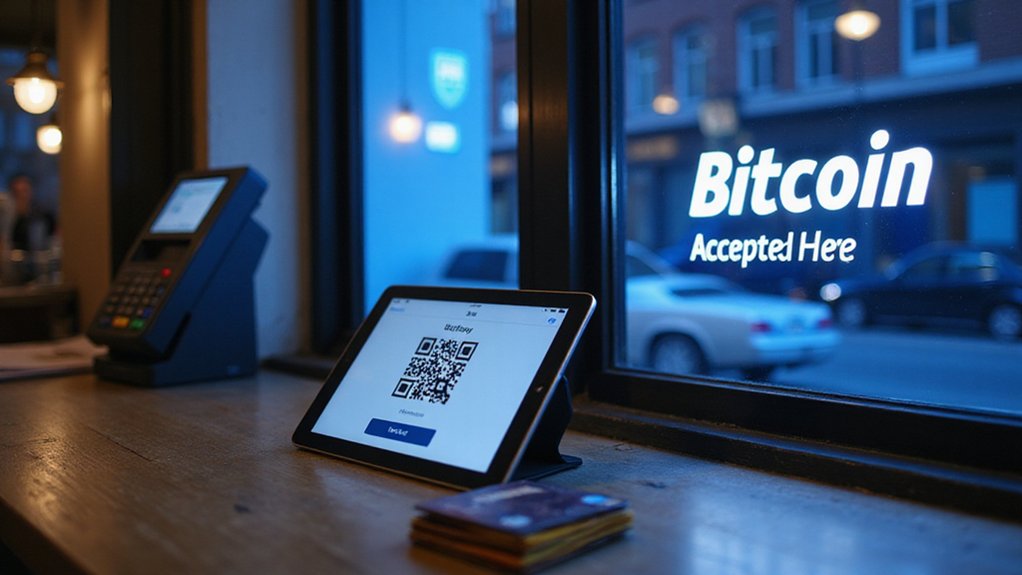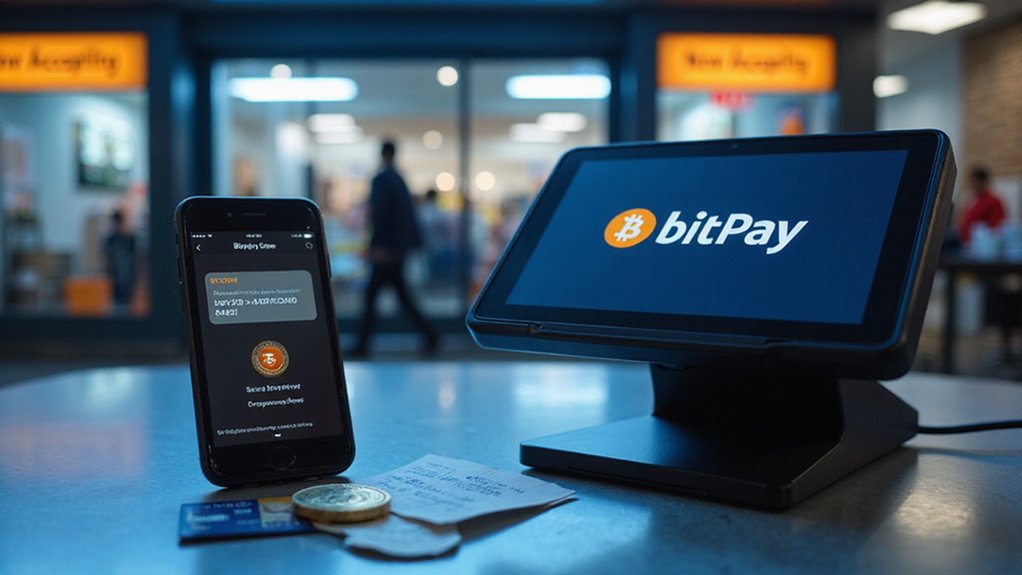BitPay, founded in 2011 by Tony Gallippi and Stephen Pair, stands as one of cryptocurrency’s pioneering payment processors. The platform elegantly solves a fundamental crypto-commerce problem: volatility risk. By instantly converting Bitcoin (and now Ethereum, Bitcoin Cash, and stablecoins) into fiat currencies, merchants can accept digital payments without exposure to market fluctuations. Operating in over 200 countries with SOC 2 Type II certification, BitPay has attracted major clients like Microsoft—rather compelling evidence of cryptocurrency’s gradual march toward mainstream legitimacy.

A thorough guide to BitPay—the pioneering cryptocurrency payment processor that has been bridging the gap between digital assets and mainstream commerce since its inception in 2011.
Founded by Tony Gallippi and Stephen Pair with the express purpose of facilitating cryptocurrency adoption among conventional businesses, the company rapidly expanded its merchant base, reaching an impressive 10,000 clients by September 2013—no small feat for what was then still considered a niche financial instrument.
The core value proposition of BitPay centers on its ability to mitigate the notorious volatility inherent in cryptocurrencies.
BitPay’s fundamental strength lies in neutralizing cryptocurrency’s price volatility—the critical barrier separating digital assets from mainstream commercial viability.
By offering instant conversion to fiat currencies across more than 15 denominations, merchants can accept Bitcoin without assuming the price fluctuation risks that would otherwise render such transactions commercially untenable.
This settlement mechanism, coupled with enterprise-grade security protocols and chargeback protection (a particularly attractive feature for businesses accustomed to the vagaries of traditional payment disputes), has attracted notable clients including Microsoft and WordPress.
BitPay’s service portfolio has expanded considerably beyond its initial Bitcoin-exclusive approach. The company recorded a significant achievement in 2013 when it processed its first $1 million transaction, demonstrating the platform’s capacity to handle large-scale payments. The platform now accommodates a wide range of payment options, allowing users to purchase everyday items from technology to fashion across various online retailers. The company continues its mission of transforming money handling for both businesses and individuals worldwide.
The platform now accommodates Ethereum, Bitcoin Cash, and various stablecoins, reflecting the evolving cryptocurrency ecosystem.
The company’s multi-signature wallet infrastructure and SOC 2 Type II certification underscore its commitment to security—a prerequisite in an industry where catastrophic breaches remain distressingly commonplace.
Perhaps most indicative of BitPay’s mainstream ambitions was the 2016 introduction of its Visa Prepaid Debit Card, allowing users to spend cryptocurrency at conventional retail outlets accepting Visa.
Despite a temporary setback in 2018 with the dissolution of the WaveCrest partnership, BitPay subsequently established direct integration with Visa, reinforcing its position at the interface between traditional and digital finance.
Operating across more than 200 countries with thorough compliance frameworks adapted to regional regulations, BitPay has maintained its position as one of the oldest and most established cryptocurrency payment processors—a remarkable achievement in a sector where longevity remains the exception rather than the rule.
Frequently Asked Questions
How Quickly Are Bitpay Transactions Processed?
BitPay transaction processing times vary considerably based on blockchain confirmation requirements.
Bitcoin transactions need six confirmations (typically under an hour with adequate fees), while ETH and ERC20 tokens demand 50 block confirmations.
Network congestion, fee levels, and blockchain protocols all impact processing speed.
During peak congestion periods, transactions can experience delays stretching from hours to days—a reminder that decentralized finance operates on its own peculiar timeline, indifferent to one’s urgency.
Does Bitpay Work With Other Cryptocurrencies Besides Bitcoin?
BitPay supports an extensive cryptocurrency ecosystem—over 100 coins and tokens across major blockchains, not merely Bitcoin.
The platform accommodates meme coins (Shiba Inu, ApeCoin), stablecoins (USDC, Tether), and assets from multiple chains including Ethereum, Polygon, and BNB Chain.
This wallet-agnostic system works with virtually any non-custodial wallet, from MetaMask to Ledger.
BitPay regularly expands its supported currencies based on community demand—cryptocurrency’s version of democratic monetary policy, if you will.
What Are Bitpay’s Transaction Fees Compared to Traditional Payment Processors?
BitPay offers a tiered fee structure that often undercuts traditional payment processors, particularly at higher transaction volumes.
While standard processors like PayPal charge around 2.9% + 30¢ per transaction, BitPay’s rates descend from 2% + 25¢ to as low as 1% for merchants processing over $1 million monthly.
The cryptocurrency specialist maintains competitive pricing despite operating in a niche market—though merchants should note that high-risk industries face premium rates, a financial reality that traditional processors similarly impose.
Can Bitpay Be Integrated With Existing E-Commerce Platforms?
BitPay integrates seamlessly with major e-commerce platforms through prebuilt plugins for Magento 2, Shopify, WHMCS, Wix, WooCommerce, and BigCommerce.
These solutions offer minimal coding requirements and automatic payment processing, converting cryptocurrency to local currency.
For Salesforce Commerce Cloud users, third-party custom development options exist through providers like EPAM.
The platform’s API-first approach also enables bespoke integrations, supported by client libraries in multiple programming languages and a sandbox environment for risk-free implementation testing.
How Does Bitpay Handle Cryptocurrency Price Volatility?
BitPay addresses cryptocurrency volatility through a multi-faceted approach: immediate conversion of crypto payments to fiat currency, asset diversification across multiple cryptocurrencies, and strategic utilization of stablecoins as transaction bridges.
Their system enables merchants to receive settled payments in traditional currency while customers pay in crypto—effectively transferring the volatility risk from businesses to BitPay’s infrastructure.
This risk management framework, bolstered by sophisticated blockchain technology, insulates merchants from the notorious price fluctuations that might otherwise render crypto payments commercially impractical.









